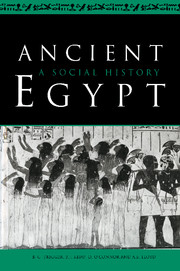Preface
Published online by Cambridge University Press: 05 June 2012
Summary
Ancient Egypt has proved remarkably resistant to the writing of history which is not traditional in character; which is not, in other words, concerned primarily with the ordering of kings and the chronicling of their deeds. Traditional, narrative history is the inescapable key to man's historic past, but alongside this the twentieth century has seen the emergence of a rich and varied range of alternative approaches, opening up for exploration such fields as social and economic change and the structure of political formations. These alternative approaches mirror the many ways in which we analyse our own contemporary societies; and thus they begin to provide continuity between past and present. If the thread of continuity in the institutions of society is followed far enough into the past, it leads us to the early civilizations of which Egypt was one. Although much of the superficial image of ancient Egypt is of a remote and alien world – and herein lies much of its popular appeal – Egypt was one of a small number of centres which first developed on a significant scale the apparatus of exploitation and of bureaucratic government together with an ideology of social coherence, and so created the basis for all modern states. Egypt has a particular interest because, with relatively little disruption, one can trace the course of development from primitive society to a time when the country became just one part of a wider world of Mediterranean culture where the innovations of formative phases had long been taken for granted.
- Type
- Chapter
- Information
- Ancient EgyptA Social History, pp. xi - xivPublisher: Cambridge University PressPrint publication year: 1983



